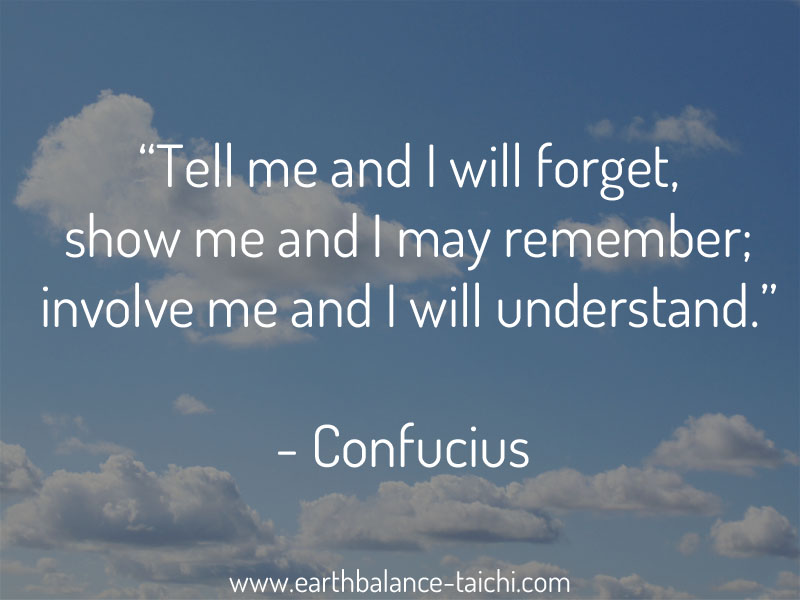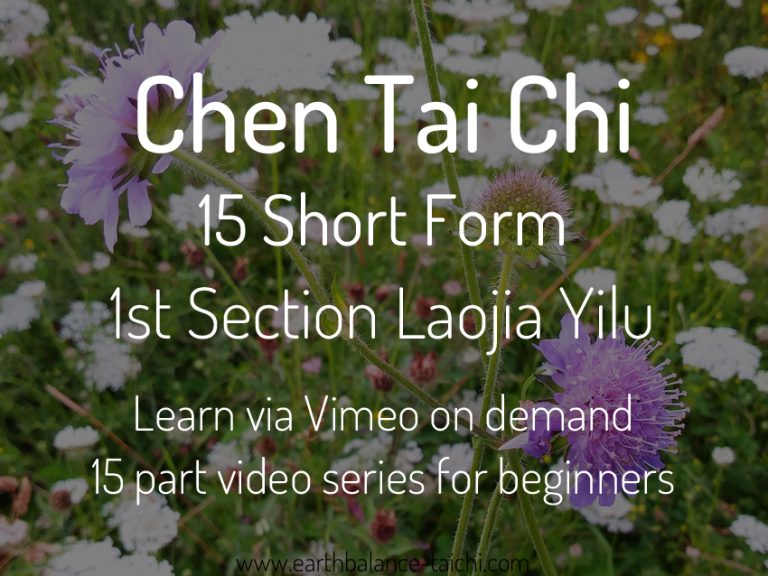When Resources aren’t Enough

When Resources aren't Enough
A delve into the Tai Chi learning process, looking at the ebb and flow of training a life-long art. When learning Tai Chi, there are several highs and lows along the way. Sometimes students will say “The resources aren't enough”. As an instructor and student, I would like to share my view on this statement, looking deeper into the meaning. First off, let's examine the resources for the Chen style Tai Chi 18 short form:
- Warm Up Clips
- Names of the 18 Form Movements
- Various Youtube Clips
- GM Chen Zhenglei Chen 18 Form Book
- Master Wang Hai Jun Chen 18 Form Digital Download DVD
Here are some typical phrases that go along with “The resources aren't enough”:
- “I can't do the form when you are not in front of me”.
- “I don't want to do it on my own”.
- “I've lost it”.
- “I forget the movements”.
- “I don't practice at home in-case I make a mistake”.
- “I go blank when I go home”.
- “Why can't I remember the movements?” (based on 1 hour a week of class training).
These statements focus on what the student cannot do, the negative, rather than what the student can do. Here's how we flip this:
- “When my instructor is not in front of me, I do not panic, I do what I can”.
- “I can remember the movements up to this point in the form”.
- “I make notes in class to read at home”.
- “My strengths lie in these movements, so I practice the ones I am not as confident with”.
- “I practice what I can remember at home”.
- “I spend time outside of class watching DVDs, youtube clips and reading books to enhance my training”.
- “I bring questions from my own practice into class”.
- “I understand that regular practice outside of class is needed for me to remember the movements”.
Be Active
A student must take an active part in the learning process. Tai Chi is not an easy art to learn. It takes years of practice, diligence, patience, awareness, grace and effort to reach a good level. What a student puts into their training both in the classroom and at home is what they can expect to gain from the practice. Students must be willing to take responsibility for their own progress, study and learning. The instructor can only ever walk beside a student on their Tai Chi path, showing them the way, it is the student who must initiate and do.
So this is why the phrase “the resources aren't enough” means something completely different to me, as an instructor, and as a student. I have heard every reason, challenge and barrier for students not to engage in their own learning. As a teach I can navigate a student around these challenges, as long as they are open and willing to move forward. To learn the Tai Chi form and the principles of movement, students must apply effort over a long time, there is no quick fix, or side stepping, or getting someone else to do it for them. As a student, it may well be that 'what you think you want to learn' and 'what you realistically are actively committed to learning' are two different things. It's input vs output.
At my school, the lessons are split into two different types, that accommodate both the formal learner and the casual learner. Casual learners can attend the drop-in classes which offer a more relaxed way of learning Tai Chi and Qigong without structured progression, where there is no need to practice at home, a dip in and out class that focuses on healthy movement for everyone. The formal Tai Chi courses are not 'watch and follow', they involve being taught a method of movement so that you learn how, why and when to move. In these courses it is expected that students are responsible for their own learning path.
When faced with the “The resources aren't enough” statement, it is not a case of what else your instructor can do for you in 60 minutes a week. It is a case of what you can do for yourself. How can you overcome any obstacles or difficulty you are facing in learning Tai Chi? How do you take responsibility for your learning?
For the Chen 18 Form.... What can you do outside of the one hour a week class that will improve your form? What can you practice everyday at home? What DVD can you play, pause, rewind, play, pause, rewind? What book can you read detailing the weight shifts, arm postures, body movement? What flick book can you check your posture against? What you tube clips can you watch, then practice, then watch and practice? What other classes can you attend in the same week, or weekend workshops, or private tuition? And so on.
I was a beginner student once, and I always say to my students, if I can learn Tai Chi, anyone can. I'm not super human, my memory can be sketchy, I have lists for lists and I can be clumsy. I use the same resources as my students, and still study and re-learn the basics frequently. What makes the difference here is that I am active in my learning process. I practice, read, watch, listen, absorb, question, make mistakes, errors and boo boos, I forget, re-learn, correct, forget again, interpret and study more and more. I love Tai Chi, I love the freedom of slow movement and because I enjoy it so much, it's not like learning at all. It's fascinating and perplexing at the same time, it challenges me in many ways that help me grow as a person. It's frustrating, enjoyable, healthy and wonderful.
Life Long Learning
There is no end point to the learning in Tai Chi, I don't have enough years of life left to reach that! So instead of looking at the goal, enjoy the journey, and I mean really enjoy it. If it's not something you like doing, why do it? Why would anyone want to spend one hour a week, doing a physical activity they don't truly enjoy, whilst saying "I can't, I forget, I don't etc. etc,). It's beyond me.
Before I go, I want to talk over illusions in training Tai Chi. A student would have false hope to believe that one hour a week will equal great progress. Before you start your journey, consider if Tai Chi is really for you? Can you persevere through difficulty, with slow development? Are you committed to learning and using all tools available to enhance your training, understanding and progress. If the answer is no, then learning the Tai Chi form may not be for you.
Students who take responsibility for their own learning progress well, build muscle memory, absorb the principles and retain the movements. Students who don't, don't. It's all in the mindset and attitude towards the learning process. Many students see struggle as failure and without hope. Some students then blame the instructor for what really is their own lack of responsibility. Remember that your instructor can show you the door into your Tai Chi journey, it is up to each student to walk through independently, with eagerness, excitement, patience, diligence, focus, gentleness and an open heart.











